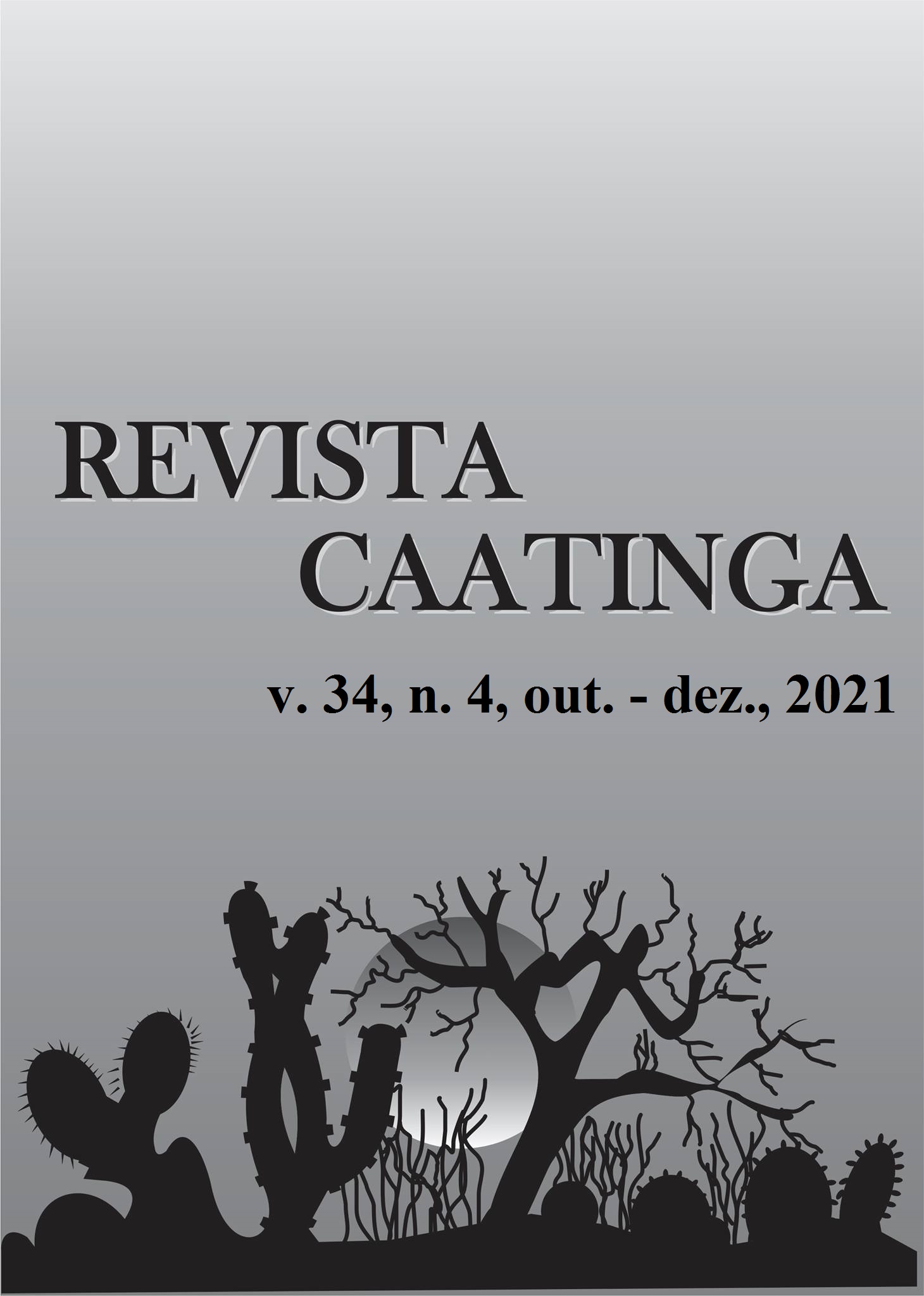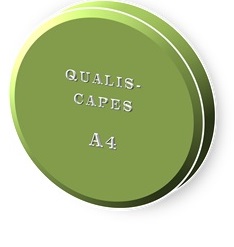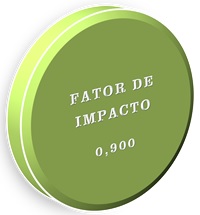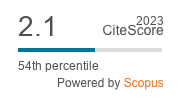EFFECT OF POULTRY LITTER BIOCHAR ON THE NUTRITIONAL STATUS OF CORN
DOI:
https://doi.org/10.1590/1983-21252021v34n419rcKeywords:
Zea mays L.. Plant nutrition. Poultry waste.Abstract
Corn, one of the main grain crops in Brazil, needs to have its nutritional requirements fully satisfied to achieve high biological productivity. Thus, the objective of this work was to evaluate the influence of increasing doses of poultry litter biochar on nutrient concentrations in the leaves of hybrid corn BRS 2022 and in the soil after harvest. The experiment was carried out in a completely randomized design, with four replicates, evaluating six doses of biochar (0; 2.02; 4.05; 6.07; 8.10 and 10.12 t ha-1) and the plots composed of one plant per pot with a volume of 20 dm3. The collection of leaves for leaf diagnosis was carried out at the time of flowering, removing the opposite leaf from the ear base in the middle third region. These leaves were dried in a forced air circulation oven, 65 °C, for a period of 48 hours, ground, sieved through 20 mesh and analyzed for the concentrations of macronutrients in the leaf tissue. At the end of the experiment, 83 days after corn sowing, soil samples were collected as a function of the treatments and then analyzed chemically. Biochar application promoted an increase in the leaf contents of N, P and K, resulting in improvements in the nutritional status of plants for these nutrients. The chemical characteristics of the soil, analyzed after the corn harvest, revealed that there was an influence of the doses of biochar on the levels of calcium, organic carbon, potassium and phosphorus.
Downloads
References
ANDRADE, C, A. et al. Mineralização e efeitos de biocarvão de cama de frango sobre a capacidade de troca catiônica do solo. Pesquisa Agropecuária Brasileira, 50: 407-416, 2015.
BRASIL. Ministério da Agricultura, Pecuária e Abastecimento. Projeções do Agronegócio: Brasil 2012/2013 a 2022/2023 / Ministério da Agricultura, Pecuária e Abastecimento. Assessoria de Gestão Estratégica. – Brasília: Mapa/ACS, 2013.
BÜLL, L.T. Nutrição mineral do milho. In: BULL, L.T.; CANTARELLA, H. (Eds.). Cultura do milho: fatores que afetam a produtividade. Piracicaba, SP: Potafos, 1993. v. 1, cap. 5, p. 63-131.
BUTNAN, S. et al. Biochar characteristics and application rates affecting corn growth and properties of soils contrasting in texture and mineralogy. Geoderma, 237: 105-116, 2015.
CARMO, C. A. F. S. et al. Métodos de análise de tecidos vegetais utilizados pela Embrapa Solos. Rio de Janeiro, RJ: Embrapa Solos, 2000. 41 p.
CAVALCANTE, A. R. et al. Effect of increasing doses of poultry litter biochar, incubated in the soil for different periods, on the radish development. Sylwan, 165: 22-34, 2021.
CHAVES, L. H. G. et al. Characterization of poultry litter biochar for agricultural use. Sylwan, 164: 468-487, 2020.
COOMER, T. D. Influence of poultry-litter biochar on early-season growth in cotton. 2013. 34 f. Undergraduate Honors Theses (Crop, Soil and Environmental Sciences) - University of Arkansas, Fayetteville, 2013.
DELUCA, T. H. et al. “Biochar effects on soil nutrient transformations,” In: LEHMANN, J.; JOSEPH, S. Biochar for Environmental Management: Science, Technology and Implementation. 2. ed. New York, NY: Routledge, 2015. cap. 15, p. 419-452.
FERREIRA, D. F. Sisvar: a computer statistical analysis system. Ciência Agronômica, 35: 1039-1042, 2011.
GLASER, B. et al. Biochar organic fertilizers from natural resources as substitute for mineral fertilizers. Agronomy for Sustainable Development, 35: 1-13, 2014.
GOTT, R. M. et al. Diagnostic index for interpretation of foliar analysis of corn. Revista Brasileira de Engenharia Agrícola e Ambiental, 18: 1110-1115, 2014.
HAWKESFORD, M. et al. Functions of Macronutrients. In: MARSCHNER, P. (Ed.). Marschner’s Mineral Nutrition of Higher Plants. Cambridge, UK: Academic Press, 2011. cap. 6, p. 135-189.
INAL, A. et al. Impacts of biochar and processed poultry manure, applied to a calcareous soil, on the growth of bean and maize. Soil Use and Management, 31: 106-113, 2015.
JIUXIN, G. et al. Effect of ammonium and nitrate sole supply and nitrogen levels on nitrogen, phosphorus and potassium content and accumulation of maize (Zea mays L.) under water-logging stress at seedling stage. Journal of Northwest Agriculture and Forestry University. 40: 185-192, 2012.
KALAJI, H. M. et al. Identification of nutrient deficiency in maize and tomato plants by in vivo chlorophyll a fluorescence measurements. Plant Physiology and Biochemistry, 81: 16-25, 2014.
LAURENTINO, L. G. S. et al. Melon seedlings phytomass under poultry litter biochar doses. Agricultural Sciences, 12: 181-197, 2021.
LIMA, W. B. et al. Growth and development of bell peppers submitted to fertilization with biochar and nitrogen. Agricultural Sciences, 10: 753-762, 2019.
MADIBA, O. F. et al. Biochar increases availability and uptake of phosphorus to wheat under leaching conditions. Biology and Fertil Soils, 52: 439-446, 2016.
MALAVOLTA, E.; VITTI, G. C.; OLIVEIRA, S. A. Avaliação do estado nutricional das plantas. 2. ed. Piracicaba, SP: Potafos, 1997. 319 p.
RESENDE, A. V. Análise foliar complementa a adubação do milho. Campo & Negócios, 11: 18-23, 2014.
SABIJON, J.; SUDARIA, M. A. Influence of poultry litter char on phosphorus availability and growth performance of corn (Zea Mays L.) in degraded soil. International Journal of Agriculture, Forestry and Life Science, 2: 154-163, 2018.
SARA, Z.; SHAH, T. Residual effect of biochar on soil properties and yield of maize (Zea mays L.) under different cropping systems. Open Journal of Soil Science, 8: 16-35, 2018.
TASIM, B. et al. Quality Evaluation of Biochar Prepared from Different Agricultural Residues. Sarhad Journal of Agriculture, 35: 134-143, 2019.
TEIXEIRA, P. C. et al. Manual de métodos de análise de solo. 3. ed. Brasília, DF: EMBRAPA, 2017. 573 p.
TITO, G. A. et al. Biochar on soil chemical properties and beak pepper (Capsicun chinense) production. Agricultural Sciences, 11: 1133-1142, 2020.
WANG, Z. et al. Effect of different amounts of biochar on meadow soil characteristics and maize yield over three years, BioResources, 14: 4194-4209, 2019.
XIAO, Q. et al. Responses of crop nitrogen partitioning, translocation and soil nitrogen residue to biochar addition in a temperate dryland agricultural soil. Plant Soil, 418: 405-421, 2017.
ZHENG, H. et al. Impacts of adding biochar on nitrogen retention and bioavailability in agricultural soil. Geoderma, 206: 32-39, 2013.
Downloads
Published
Issue
Section
License
Os Autores que publicam na Revista Caatinga concordam com os seguintes termos:
a) Os Autores mantêm os direitos autorais e concedem à revista o direito de primeira publicação, com o trabalho simultaneamente licenciado sob a Licença Creative Commons do tipo atribuição CC-BY, para todo o conteúdo do periódico, exceto onde estiver identificado, que permite o compartilhamento do trabalho com reconhecimento da autoria e publicação inicial nesta revista, sem fins comerciais.
b) Os Autores têm autorização para distribuição não-exclusiva da versão do trabalho publicada nesta revista (ex.: publicar em repositório institucional ou como capítulo de livro), com reconhecimento de autoria e publicação inicial nesta revista.
c) Os Autores têm permissão e são estimulados a publicar e distribuir seu trabalho online (ex.: em repositórios institucionais ou na sua página pessoal) a qualquer ponto antes ou durante o processo editorial, já que isso pode gerar alterações produtivas, bem como aumentar o impacto e a citação do trabalho publicado (Veja O Efeito do Acesso Livre).







